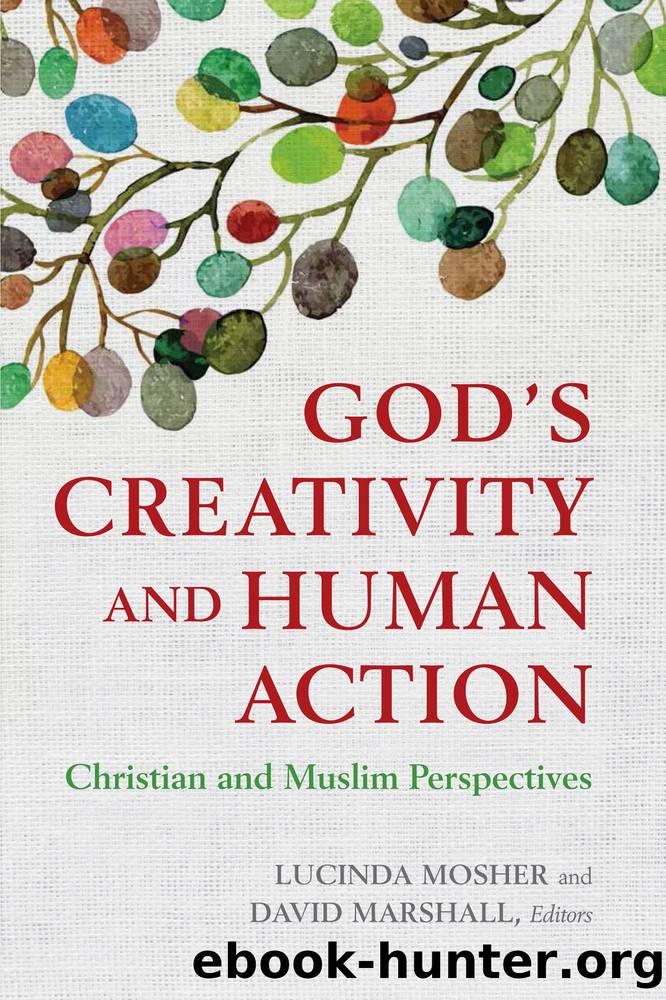God's Creativity and Human Action by Lucinda Mosher David Marshall & David Marshall

Author:Lucinda Mosher,David Marshall & David Marshall [Mosher, Lucinda & Marshall, David]
Language: eng
Format: epub
ISBN: 9781626164864
Publisher: Georgetown University Press
Published: 2017-09-15T00:00:00+00:00
The Creative Humility of Adam
Adam was called to cultivate the garden in Eden that God planted for him (Gen. 2:8, 15). This consisted both of unifying creation in himself, which we can see in his naming of the animals (Gen. 2:19â20), but he did this precisely through referring all of that creation, including himself as its head, back to God. He lifted it up beyond itself and himself to its source and origin, naming and claiming it as his own and, in giving it his own stamp or name, appropriating it for its Creator, God. But this elevation of creation required both gratitude for the gift of life given to humankind seen in the tree of life upon which they fed and which gave him immortality (Gen. 2:9; 3:22, 24) and above all a rich receptiveness or trust in all of Godâs commandsâthat is, a humility or groundedness of heart (Latin, humilis [humble] being related to humus [earth, soil]). Such creative humility of Adam would have allowed him to accept the apparently arbitrary command of not eating of the Tree of the Knowledge of Good and Evil (Gen. 2:16â17). Creation and humanity were mortal, and both could live only through humankindâs constant referral of the gifts of the world and himself back to God, by his offering of it as mediator or âpriest of creationâ to his Creator.39
Putting this Christian theological perspective slightly differently, the initial vocation of humanity, as summit, summary, king, and microcosm of creation, is for him to consciously, freely, and thankfully appropriate the world and his own nature given to him as a good gift from the Creator and in this way making it both his own and Godâs own, good for himself and all creation in finding its union with God. When humanity offers up itself and creation to God, it then receives it back transformed into a new humanity and new creation partaking of the divine life, the Spirit, graciously synthesizing in itself the uncreated with the created. In other words, by freely making his own what is gifted to him by God, humanity starts the process of transforming the divine imprintâthe image of Godâmore and more into the likeness of God so that he might have a âshare of [the very same] beingâ40 that is the divine life, becoming a participant of the divine nature (2 Pet. 1:4). This led Maximus the Confessor and Gregory of Nazianzus (c. 329â90) audaciously to call humanity a âportion of God.â41 Thus, the vocation of humanity, according to this Christian perspective, is to be a mediator in creating, accepting, and transforming creation into the divine life of love of God and with it becoming adopted sons and daughters of God âthrough grace by imitation.â42 This in no way makes a human being a âgodâ by substance, for the creature is not and never will be its Creator. That would be pantheism, polytheism, and idolatry from a Christian perspective. Indeed, it is precisely because of these reservations that
Download
This site does not store any files on its server. We only index and link to content provided by other sites. Please contact the content providers to delete copyright contents if any and email us, we'll remove relevant links or contents immediately.
The Lost Art of Listening by Michael P. Nichols(7506)
Why I Am Not A Calvinist by Dr. Peter S. Ruckman(4153)
The Rosicrucians by Christopher McIntosh(3519)
Wicca: a guide for the solitary practitioner by Scott Cunningham(3178)
Signature in the Cell: DNA and the Evidence for Intelligent Design by Stephen C. Meyer(3138)
Real Sex by Lauren F. Winner(3022)
The Holy Spirit by Billy Graham(2952)
To Light a Sacred Flame by Silver RavenWolf(2823)
The End of Faith by Sam Harris(2742)
The Gnostic Gospels by Pagels Elaine(2531)
Waking Up by Sam Harris(2460)
Nine Parts of Desire by Geraldine Brooks(2368)
Jesus by Paul Johnson(2362)
Devil, The by Almond Philip C(2331)
The God delusion by Richard Dawkins(2309)
Heavens on Earth by Michael Shermer(2284)
Kundalini by Gopi Krishna(2184)
Chosen by God by R. C. Sproul(2164)
The Nature of Consciousness by Rupert Spira(2108)
